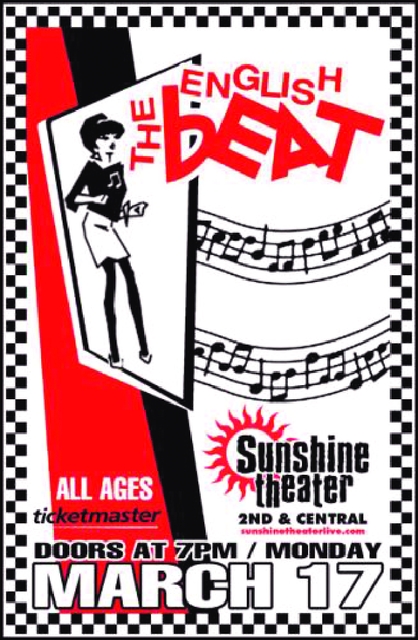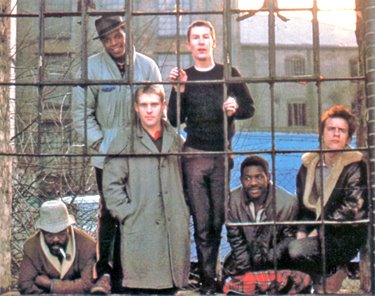Between 1978 and 1983 The Beat (known in North America as The English Beat) was a pre-eminent part of the ska revival movement known as 2 Tone. As the second-wave legends they became, the group, already greatly endowed by Saxa, a saxophonist who had played with the likes of Desmond Dekker, shared the stage with the distinguished acts of the era such as David Bowie, The Clash, The Police, The Pretenders and Talking Heads. Three decades and 6,000 miles of separation later, the one original band has become two. Original toaster Ranking Roger continues the legacy in England as The Beat, and Dave Wakeling, the band’s original singer, carries on the American contingent as The English Beat. Wakeling, also a 20-year stateside resident, a former Greenpeace employee, personal hero and an all-around nice guy, took time to talk to me over the phone this week. What was it like when you were growing up, and how did music become part of your life? I used to be a competitive swimmer. Driving home from swim meets, if I’d won, my Dad used to let me sit in the car with the radio on while he went to the bar to celebrate. I’d sit in the backseat with an orange soda, the chlorine from the pool still in my eyes, clutching my little medal, and I’d listen to the radio. It was such an emotional time, and it was the first time I remember music moving me deeply. I was shaking and tearful. It was two songs at that period—“Walk Away Renee" by The Four Tops, and "Ruby Tuesday" by The Rolling Stones, and they came on the radio one after the other. That’s my first memory of it. I think I’ve always liked a tune, though. The band you went on to form later in life is considered second-wave ska. Would you explain the taxonomy of ska music? Well, the first wave of ska came out of Jamaica in the late ’60s. Ska could be a mixture of things itself—calypso, mento and all sorts of different beats. Our take on it, the second wave, was we were trying to mix punk and reggae. We were trying to create the punky reggae party. We wanted the excitement of punk and the seductive backbeat of reggae in the same tune, and when we got our beat going we realized it was similar to the hypnotic beat of the original ska.We also incorporated some of the beats from motown, which was some of our favorite musics at the time. The second wave of ska was known as 2 tone after the Specials’ record label. The third wave of ska, which came in the ’90s, took influence from what the second wave had done, and put their own stamp on it. Now we’re currently enjoying the fourth wave of ska, which in many ways I think has gone back to the direct link of the first wave of ska, in the sense that it’s almost retro in the way they emulate the sounds of Jamaica from the late ’60s. So what are some examples of bands from the fourth wave? The Aggrolites, West Bound Train, and Pressure Cooker. Those are three of my favorites. In England you’ve got a band called Dualers. All of those hark back to original ska. A lot of original first wave ska was played by jazz musicians, and a lot of the jazz musicians in Jamaica had been used to making a living in the casinos in Cuba. So it had a jazzy feel, and they were very accomplished musicians, although some of the ska beats were very direct and obvious. I read that you have a guitar in the rock ‘n’ roll hall of fame. I do indeed, and I still haven’t learned to play it properly. It’s a great feeling because it gives you an extra thrill—something like not doing your homework, but still acing the quiz. Your music, almost 30 years ago now, had political undertones. If you were a new band today what would the politics be; what would you be talking about? Luckily for us, and I think one of the reasons the music has endured is because the message in the songs seems particularly pertinent again—that we’re basically all in the same boat, that we need to have the courage to extend compassion to each other, and that if killing worked it would have worked by now.We have one song, "Stand Down Margaret," which was about our dear British prime minister Margaret Thatcher, and I have taken, on this last tour, to singing the last chorus "Stand Down Hilary." Because I am deeply a Barack Obama fan, and I’m appauled at the monstrous tactics of Hilary Clinton’s campaign. I’m very dissapointed. I was a fan of the Clintons when they were in power. I thought they did some good stuff, and it was nice to have the books balanced, but I’m just appauled by what seems to be this sense of entitlement to power, and the willingness to say anything, do anything in order to get it. I think the world has turned too many times for that. Although sometimes I wish [Obama] would bite back, but I understand why he’s taking the higher ground….I would look forward to a time when the government showed the same kind of kind of common decentcy and human respect, as I can really find travelling across this country, and I think Barack Obama can do this. Are you able to vote, are you a citizen? I’m not a citizen, no. I thought about it, but I have a teenage son, and when Iraq kicked off we were all terribly worried about the draft, so I decided to remain British just in case, so I could get him out of there quick. In case they started measuring him up for fatigues. Especially with McCain’s notions of 100 years wars. Send your kid. Radiohead and Nine Inch Nails have released free records. Do you have any reflections on that and the state of the recording industry? I think it’s the wave of the future. I think the copyright horse has left the stable, and the doors open. I don’t think that the record companies have ever come up with a way to sell music that’s respectful, it’s never been respectful to the artists. And then people can download stuff anyway. I think the game is up, kind of. So I think there’s a good chance that records would be like free goods that you use to attract people to come to your concerts. I can see that being more and more of the thing, I think. So what propels you to keep touring? It’s a terrific way to make a living, it’s still better than working for a living, and I actually really adore being on stage.
Dance like crazy—new wave or ska style—Monday, March 17, at the Sunshine Theater. Doors open at 7 p.m. The show is all-ages, tickets are $17 and available via TicketMaster or through www.sunshinetheaterlive.com. Bom-bom!










